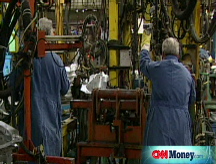Big rally on Wall Street
A surprisingly strong revision to second-quarter economic growth gives stocks a boost. Oil prices turn lower as worries about a possible Gustav disruption ease.

NEW YORK (CNNMoney.com) -- Stocks jumped Thursday, with the Dow and S&P 500 rising for the third straight session thanks to lower oil prices, a surprisingly strong reading on second-quarter economic growth, and a rally in the financial sector.
After the close, Dell (DELL, Fortune 500) reported earnings that fell from a year ago and missed forecasts on sales that rose from a year ago and topped forecasts.
The Dow Jones industrial average (INDU) added 212 points, or 1.9%. The broader Standard & Poor's 500 (SPX) index added 1.5% and the Nasdaq composite (COMP) gained 1.2%.
The Dow Jones Transportation (DJTA) average rallied 2.6%, as investors boosted railroad, trucking and airline stocks in response to the falling oil prices. Lower fuel costs have a direct impact on the profits of transportation companies.
Stocks gained modestly in the morning, and the GDP report was countered by a spike in oil prices, as Tropical Storm Gustav careened toward the Gulf Coast. But, by late morning, oil prices fell as traders bet the government would release supplies from the Strategic Petroleum Reserve. Oil also declined after a report showed a jump in natural gas supplies last week.
The turnaround in fuel prices gave stock investors their second wind, and sent Wall Street to its best levels of the session.
Leading the charge was the financial sector, which has now risen for three sessions in a row. It was the best stretch for the sector since the big stock selloff in mid-July, said Donald Selkin, chief market strategist at National Securities.
Selkin noted that Fannie Mae and Freddie Mac have risen for six sessions in a row, as fears that they are set to be taken over by the government seem to have dwindled. "The fact that the big guys are doing better is positive for the whole group," he said.
But for the overall stock market to keep climbing beyond today, the financials have to keep rising, Selkin said.
Also a plus on Thursday: "At least the market is reacting positively to better economic data, both yesterday and today," he said.
Friday brings reports on personal income and spending, manufacturing in the Midwest region and consumer sentiment.
GDP: Gross domestic product, the broadest measure of the economy, increased by a 3.3% annualized rate in the second quarter, the government reported. The revised reading improved on the initial report of 1.9% that was issued late last month, and topped expectations for a growth rate of 2.7%.
It was the best reading since the third quarter of 2007, and showed a marked improvement from the sluggish 0.9% pace in the first quarter. However, the growth was largely due to a spike in exports as a result of the weak dollar - and the more than $90 billion in economic stimulus checks that reached taxpayers during the quarter. (Full story).
"It was a bit of a relief that we saw such good trade numbers in the quarter that kept GDP growth on a positive slant, but it doesn't change anything," said Scott Anderson, a senior economist at Wells Fargo.
He explained that as global growth wanes and the dollar continues to firm up, exports will slow and the "trade effect" will dissipate. Subsequently, he expects slowing growth and flat demand through the second half of the year.
In other economic news, a separate government report showed that the number of Americans filing new claims for unemployment fell for the third week in a row, meeting expectations.
Fuel prices: Oil prices spiked to $120.50 a barrel before retreating as investors considered whether the government would access the Strategic Petroleum Reserve if Tropical Storm Gustav disrupts key production facilities in the Gulf of Mexico. (Full story).
U.S. light sweet crude oil for October delivery fell $2.56 to settle at $115.59 a barrel on the New York Mercantile Exchange.
Retail gas prices continued to drop overnight, extending the downward trend, according to a survey of gas station credit-card activity. Gas prices are down 11% from all-time highs hit in mid-July. (Full story.)
Financials: Fannie Mae (FNM, Fortune 500) and Freddie Mac (FRE, Fortune 500) shares rallied after Fannie announced management changes late Wednesday. The government-sponsored finance giant is promoting three executives and firing three executives - including its chief financial officer.
Bond insurers rallied in active trade after MBIA (MBIA) said it scooped up $184 billion in municipal bonds currently backed by privately-held insurer FGIC. The deal could mean FGIC, owned by the Blackstone Group (BX), may be able to avoid bankruptcy. The company has been on the brink of insolvency as it has scrambled to raise capital after having its ratings cut to junk status amid the credit-market collapse.
MBIA jumped 34.8% in active NYSE trade and competitor Ambac Financial (ABK) jumped 41.6%.
Other movers: Tiffany & Co. (TIF) reported stronger fiscal second-quarter sales and earnings that topped expectations and also boosted its full-year forecast.
The luxury jeweler also said that sales at stores open a year or more, a key retail measure known as same-store sales, would return to growth in the fourth quarter, which includes the holiday shopping period. Shares jumped 10.7%.
Zales (ZLC) reported a fourth-quarter loss that was narrower than expected and said quarterly sales and same-store sales rose. The jewelry retailer also forecast full-year results above current forecasts. Shares gained 20.6%.
Delta Air Lines (DAL, Fortune 500), Northwest Airlines (NWA, Fortune 500), AMR (AMR, Fortune 500) and UAL Corp (UAUA, Fortune 500) were among the big gainers in the session, following the slide in oil prices.
Twenty-nine out of 30 Dow stocks rose, with the exception of Coca-Cola. Coke (KO, Fortune 500) shares slid after Credit Suisse downgraded the stock to "neutral" from "outperform" according to reports.
Market breadth was positive and volume was light, with many Wall Street pros taking off early ahead of the long Labor Day holiday weekend.
On the New York Stock Exchange, winners topped losers by more than three-to-one on volume of 956 million shares. On the Nasdaq, advancers beat decliners by almost three-to-one on volume of 1.63 billion shares.
Other markets: In the bond market, Treasury prices slipped, raising the yield on the benchmark 10-year note to 3.78% from 3.76% late Wednesday. Prices and yields move in opposite directions.
The dollar gained, versus the euro and the yen.
COMEX gold for December delivery rose $3.20 to settle at $837.20 an ounce. ![]()




